- Home
- Colleen Gleason
The Spiritglass Charade Page 2
The Spiritglass Charade Read online
Page 2
I knew which structure had prompted his comment. “The Oligary Building. Mr. Oligary’s factories are the premier manufacturers of steam-cogs and gears. He manages his business from the offices in that building. Incidentally, Miss Adler—did you hear the news about Mr. Babbage’s Analytic Engine? There’s to be a small exhibition in the lobby of the Oligary, displaying all of Mr. Babbage’s notes and prototypes.”
“I would find that quite fascinating,” replied my mentor. “When is it to open?”
“The article in the Times said it opened today. Perhaps we can make a detour and stop there on our return.”
Miss Adler nodded, but once again I noted her tight, drawn expression. She appeared pale beneath her expertly applied rouge and was more subdued than usual. I wondered if she was ill or merely tired.
“That’s a creepy-looking building, if you ask me,” Dylan commented. “It looks like something out of Mordor. Tall, black, and shiny.”
I was used to Dylan’s references to unfamiliar places and people, as well as his odd vernacular. “I find the structure rather interesting in appearance. It’s very different from the rest of London, with our flat-faced, rectangular brick buildings lined up in a row like uneven teeth, gears and chimneys protruding from their roofs.”
Dylan turned from the window and grinned at me—an event that, I’m ashamed to admit, made my insides go soft. “And you didn’t even ask me what Mordor was,” he said in a low, teasing voice. “Surely you haven’t lost your sense of curiosity, Miss Holmes?”
My insides squished more. I hastily turned my attention back to the cityscape, studiously avoiding Miss Stoker’s gaze.
“Of course not,” I managed to say calmly. “For if I asked what you meant every time you made a reference I didn’t understand, we’d never finish a conversation. And look—there’s one of the new vendor-balloons. They make it easier for the merchants to travel without clogging up the streetwalks.”
Thus distracted, Dylan gazed out the window at the neat elliptical balloon with its small cart beneath. His thick blond hair ruffled in the breeze as drizzle splattered the windowsill, and I couldn’t help but admire his handsome features.
Unlike with Evaline Stoker, young men never teased me. They rarely even spoke to me, and certainly not with such familiarity and ease. Nor did I feel comfortable enough around them to do more than converse in a stilted fashion—or, worse, launch into some babbling lecture.
Despite the fact I rather enjoyed feeling Dylan’s solid arm jolting against me as we traveled through the clogged streets, I was impatient to arrive at Marlborough House and be apprised of the princess’s intentions.
We finally alighted from the carriage. Once ushered into the palatial home, we were directed to the princess’s private parlor. This entailed taking three steps from the threshold of the grand foyer, then stepping onto a slow-moving circular platform. When we came around to the proper direction, we stepped off the dais and onto one of three moving walkways that led to different wings of the palace. A page stood at the junction of each walkway and the circular platform, offering the assistance of a gloved hand to make the transition easier for each visitor.
The boy who handed our group off onto the walkway was wearing yellow livery, down to his gloves and shoes. Through simple observation, I noticed the young man had a fondness for caramels, had recently had his hair cut, and was left-handed.
“Notice,” I murmured to Dylan as the walkway rumbled along beneath our feet, “the pages here are dressed in yellow because they attend Prince Bertie and Princess Alexandra. The personal servants of the Queen always wear red, white, and blue.”
“Queen Victoria.” Dylan’s tones weren’t quite as circumspect as mine had been, but such wonder blazed in his eyes I didn’t have the heart to admonish him for it. “The real Queen Victoria. Do you think there’s any chance we might actually see her?”
“Not here. She is currently in residence at Buckingham Palace, and I can think of few reasons for her to come here. She is a grand lady, and very imposing, as one would expect. But she hardly ever leaves the palace anymore.”
“And . . . uh . . . who exactly is Princess Alexandra?” Dylan asked, this time in a more subdued voice.
“She is the Princess of Wales and her father is the King of Denmark. She’s married to the Queen’s son, Prince Albert Edward, informally known as Prince Bertie. Everyone loves Bertie and Alix, as she’s often called. They’re much more popular than the Queen—the princess especially.”
The end of the moving walkway approached, and I took Dylan’s arm (for he hardly ever remembered to offer it, claiming that simple courtesy was hardly ever done in 2016) as we stepped off. A yellow-gloved page was there to assist on this end of the journey as well.
A tall set of double doors confronted us. The page pulled an ornate copper lever and the entrance parted like a theater curtain, revealing a surprisingly small and cozy parlor. Because of the dampness and the princess’s propensity for taking chill, a small fire burned at the hearth.
Surprisingly—or perhaps not, due to the nature of our visit—there was only one occupant in the chamber. Her Royal Highness was sitting on a dark red settee with thick velvet cushions. Its brass frame was fashioned like a tree trunk, with elegant branches arching into sidearms on either end. A mechanical bird perched on one gleaming branch, singing softly.
Princess Alexandra was forty-five years of age—making her at least a decade older than Miss Adler—and still a slender, extremely handsome woman. She had dark hair swept into a complicated mass of braids and coils, leaving a fringe of tight dark curls just above her brows. Her almond-shaped eyes were dark and lively, framed by thick lashes. She wore a bodice with a high, lacy neck meant, I knew, to hide a small scar from her childhood. Leaning against the settee within easy reach was a gold-knobbed walking stick encrusted with emeralds and topazes. I observed the princess had recently had her fingernails buffed and used a hair dye to keep her tresses ink-black.
“Irene.” She gestured for us to approach. Her voice was warm and melodious, and she seemed much less stilted than her mother-in-law, to whom I’d been presented several times due to my father’s work. “Come in and introduce me to these most amazing young ladies. And this handsome young man.”
“I apologize for being tardy,” said Miss Adler with a curtsy. She spoke a trifle louder and slower than usual due to the princess’s partial deafness. “But you know how London traffic is.”
“Not at all,” our hostess replied with a tinkling laugh. “You know how terribly unpunctual I am! Now, please. I feel certain I’ve met this young lady when she was presented at Court. Evaline Stoker. You’re a Grantworth as well, if I recall. And you must be the Holmes girl. Mina, is it? Your father has been instrumental in assisting the Home Office with a variety of situations. And your uncle! Miraculous in his solving of crimes, if I do say so. Make yourselves comfortable, ladies. This is an informal meeting. But who are you, young man?”
Evaline and I had taken our turns curtsying during Princess Alexandra’s breathless speech, but now that the princess’s attention had fallen on Dylan, Miss Adler gestured for us to sit as she introduced him. “He is helping me with a variety of tasks at the Museum, but Mr. Eckhert was also instrumental in assisting Miss Holmes and Miss Stoker in their last assignment.”
“Well, then I must include Mr. Eckhert along with you two young ladies in my gratitude for investigating the business with the clockwork scarabs and discovering who was killing those poor girls. Thank you, most sincerely, from the bottom of my heart for stopping the Ankh before she hurt anyone else.”
While I flushed with pleasure under her open regard and appreciation, it also made me slightly nauseated. For while Princess Alexandra was correct that Evaline and I had foiled the androgynous character known as the Ankh, I alone remained unconvinced that the female body that had been recovered and identified as the murderer’s was in fact the villainous person we’d been chasing. Everyone else—including Scotland Y
ard—believed the case was closed.
I, on the other hand, had nearly accused Lady Isabella Cosgrove-Pitt, wife of the Parliamentary leader, of being the Ankh.
That had not been my finest hour. Particularly since it had been witnessed by one Inspector Ambrose Grayling of Scotland Yard.
“Thank you for giving us the opportunity to serve you and our country.” Miss Stoker inclined her head in graceful acceptance of the princess’s gratitude. “I speak for both Mina and myself when I say we are looking forward to our next assignment.”
“Indeed.” I was irritated for not having responded before Evaline did so.
“Excellent. Then I shall tell you why I have called you to attend me. But whilst I do so, if you don’t mind, Irene, would you make certain your companions sample the truffles? As you know, they are not to be missed.” The princess smiled, and a charming dimple appeared at the corner of her mouth.
“Most assuredly,” Miss Adler replied, picking up the tray on the small table next to her. “Her Highness does not exaggerate. The chocolate truffles made by her Danish pastry chef are so delicious, even the Queen makes excuses to visit in order to have one.”
Dylan and I exchanged covert glances and he waggled his eyebrows. I merely smiled and shook my head. It was simply inconceivable he’d meet the Queen any time soon.
Miss Stoker was already examining the tray of chocolates. They were each the size of a large cherry, and in a variety of unusual colors: pastel pink, robin’s egg, daffodil, mint, and iced orange. Each was enclosed in a loose, springy swirl of spun sugar that glittered in the light, giving the truffle the appearance of being in motion. I could not conceive how the chef had placed the spheric chocolates inside each delicate coil without fracturing them.
“Now,” said our royal hostess. “On to the matter I wish you to investigate. There is a young woman by the name of Willa Ashton. Her mother, Marta, and I were very close friends until Marta died, for she was one of the few ladies who came from Denmark with me. She married Ferdinand Ashton, the son of Baron Fruntmire. When I was ill with the rheumatic fever—goodness, twenty years ago that was—Marta sat with me nearly every day, and I came to love her dearly. Willa is just as charming and empathetic as her mother was, and I have summoned you today because I am greatly concerned for her mental and physical well-being.”
When the princess paused to take a sip from the tea in her delicate china cup, I took the opportunity to slip one of the bite-sized truffles into my mouth. The sugary coil melted on my tongue, and the tinted exterior turned out to be a thin shell with an essence of citrus (I had selected one of the yellow ones). But inside. . . . It was nearly impossible for me to hold back a sigh of delight, for the interior of the sweet was like nothing I’d ever tasted. Light and fluffy, chocolaty without being too rich, buttery and decadent with a hint of crunch.
“Do you not agree they are the best chocolates you’ve ever tasted?” asked the princess, obviously noticing my reaction.
As my mouth was still filled with the ambrosia, I could only nod vehemently.
“Marta died five years ago,” continued our hostess. “Before that, she and Willa often accompanied me on my visits to London Hospital. Willa has continued to do so, and she’s grown into such a sweet, lovely young woman. She spends much of her time in the children’s ward, telling them stories. The boys in particular ask for her every day, or so the nurses tell me.
“But then her younger brother, Robby, disappeared, a little less than two months ago. It’s believed he fell into a canal and drowned, but his body was never recovered. Willa isn’t convinced he’s dead, and has become obsessed with finding him. She’s become enamored with Spiritualism, and believes it can help her solve the puzzle.”
“Spiritualism? Do you mean to say Miss Ashton attends séances—or that she is acting as a medium herself?” I asked, firmly redirecting my attention from the tray of truffles, which, thanks to Dylan and Evaline, had been pared down to a meager trio of chocolates.
“She is attending them—quite regularly, in fact. And, I suspect, is paying quite a bit of money to the mediums she uses. Willa insists her mother is speaking to her from beyond—and although that may very well be true,” the princess added hastily, surely thinking of her own mother-in-law’s attraction to spirit-talking with the Queen’s dead husband, Albert, “I fear there is some other unpleasant purpose at work here. For I am concerned . . . well, I suspect either someone is attempting to fleece her fortune out from under her, or—worse—that someone is attempting to drive her mad.”
Miss Stoker
An Unexpected Maneuver
I had taken the last of the chocolates—right beneath Mina Holmes’s bladelike nose—when Princess Alexandra made her announcement about Willa Ashton.
“Fleece her fortune? Drive her mad?” I repeated, my enthusiasm deflating. That sounded beyond boring. No abductions? No chases through the streets? No visits to opium dens? I popped the chocolate in my mouth and tried not to appear uninterested.
Mina, on the other hand, looked as if she’d been given a jeweled cuff on a golden platter. No surprise there, for this was the type of problem she was good at: putting pieces of a puzzle together.
Me? Give me a dark street to patrol. A disreputable neighborhood in which to look for trouble—or at least a vampire to slay. I surreptitiously felt inside my pocket. Dylan’s sleek telephone-device was still there, waiting for me to take it to a particular seedy pub in Whitechapel.
At least I’d have something interesting to do tonight.
“What sorts of things have been happening to make you believe Miss Ashton is the target of some villainy?” my so-called partner asked.
“It’s Willa’s insistence that her brother is still alive. It’s . . . unnatural. She claims her mother has been visiting her and sending her messages from beyond. Poor Willa is filled with grief, distracted and utterly moddle-headed—I’m simply concerned she’s being taken advantage of.”
“Visits from her dead mother?” There was skepticism in Mina’s voice.
The princess shook her head. “I believe it would be best if you met Willa, and perhaps attended a séance with her. Then you can experience it—”
An urgent knock at the door had us all turning.
“Yes?”
The door opened and a wide-eyed butler appeared. “The Queen. Is here, Your Highness.”
“The Queen? How unexpected.” The princess’s brows rose up into the fringe of black curls on her forehead. “Well, don’t keep her wait—”
But she didn’t finish, for the butler’s face turned pink, then white, and he yanked the door open to reveal none other than Queen Victoria.
We all leapt to our feet, curtsying and, in Dylan’s case, bowing, as she rolled—literally—into the chamber. At seventy years of age, the Queen was large, gray-haired, and stately. She was wearing a plain, simple gown of taffeta in several shades of gray, along with a lacy white veil. Her only jewels glinted at the cuffs of her dress and in a brooch pinned to its collar. Accompanying her was a retinue of footmen, ladies, and a small copper-colored dog.
The Queen was riding upon a small platform with two dinner-plate-sized wheels, one on each side. Her veil and the hem of her skirt fluttered as she trundled across the floor, using something similar to bicycle handlebars to navigate. The small dog sat in a bucket attached to the side.
“Madam,” said the princess as she rose from her brief curtsy. “What a pleasant surprise. You’ve arrived just in time to join us for some of the chocolate truffles you enjoy so much.” She gestured to the gaping butler, who fled the chamber.
“Be seated,” said the Queen to the room as she alighted carefully from her vehicle. She made her way to the largest sofa. Two footmen assisted her in settling her bulky self, yards of skirts and petticoats, and the long lacy veil onto the cushions. The ladies who accompanied her found seats where they could—including in the ones Mina and I had just vacated.
I glanced at my companion, who, for onc
e, had nothing to say. I noticed Dylan was standing very close to Mina, and he seemed to be poking her with his elbow. Was he laughing?
“And who is this?” the Queen demanded, and Dylan sobered.
Princess Alix introduced us, but didn’t mention the reason for our visit. The Queen didn’t ask. Nor did she indicate any reason for her unexpected appearance. Instead, she seemed to be watching the parlor entrance, and we all sat in an awkward silence. The only noise came from Queen Victoria’s small, fluffy dog, who was snuffling about on the floor around the hems of everyone’s gowns. I hoped he wasn’t about to lift his leg.
Then I realized with a start that among the attendants—all of whom were ladies of the realm—was none other than Lady Cosgrove-Pitt. I smiled a greeting at her. The wife of our Parliamentary leader was an attractive woman in her early thirties, dressed expensively and in the height of fashion. She was like a bird of paradise next to our drab, pigeonlike monarch.
“Ah,” the Queen said at last when a maid and two footmen appeared. The young men were carrying tiered trays piled high with truffles.
Apparently the Queen really did like the chocolates.
“Tressa, have a large box of them packaged up for Her Majesty.” There was a subtle layer of amusement in Princess Alix’s voice. As her mother-in-law devoured several truffles almost as quickly as Dylan had, the tension in the chamber eased. Small bits of conversation sprang up.
“Why, Irene Adler. What a pleasure it is to see you . . . and not even onstage,” said Lady Cosgrove-Pitt, inclining her head toward my companion. She didn’t rise from her seat.
“Lady Isabella.” Miss Adler adjusted her wrist-clock. Her tones were unusually cool and very polite. “You’re looking quite well.”

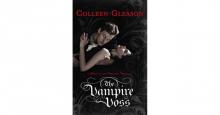 The Vampire Voss
The Vampire Voss Lavender Vows
Lavender Vows Sanctuary of Roses
Sanctuary of Roses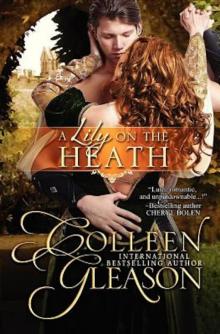 A Lily on the Heath
A Lily on the Heath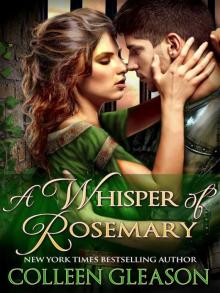 A Whisper Of Rosemary
A Whisper Of Rosemary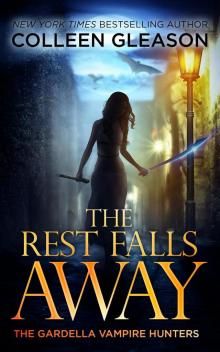 The Rest Falls Away
The Rest Falls Away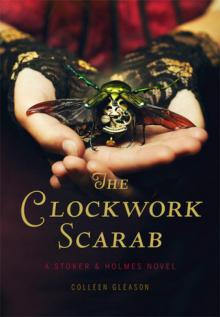 The Clockwork Scarab
The Clockwork Scarab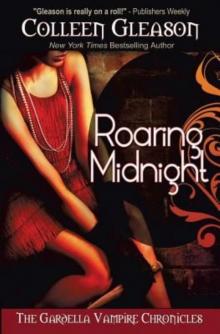 Roaring Midnight
Roaring Midnight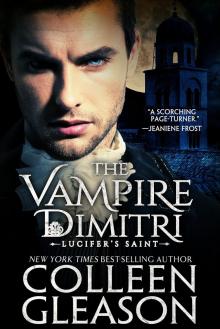 The Vampire Dimitri
The Vampire Dimitri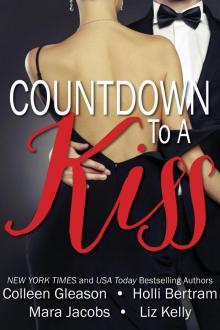 Countdown To A Kiss A New Years Eve Anthology
Countdown To A Kiss A New Years Eve Anthology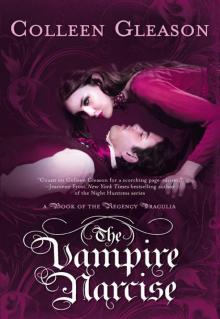 The Vampire Narcise
The Vampire Narcise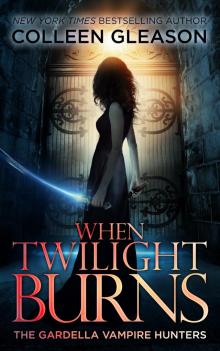 When Twilight Burns
When Twilight Burns The Bleeding Dusk
The Bleeding Dusk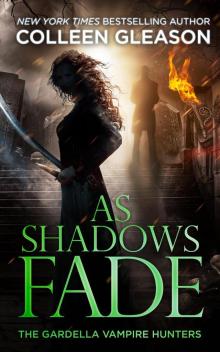 As Shadows Fade
As Shadows Fade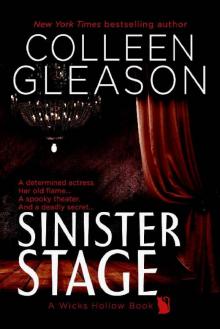 Sinister Stage: A Ghost Story Romance and Mystery (Wicks Hollow Book 5)
Sinister Stage: A Ghost Story Romance and Mystery (Wicks Hollow Book 5)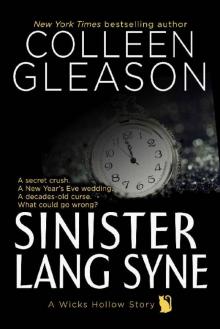 Sinister Lang Syne: A Short Holiday Novel (Wicks Hollow)
Sinister Lang Syne: A Short Holiday Novel (Wicks Hollow) Sinister Sanctuary
Sinister Sanctuary Night Beckons
Night Beckons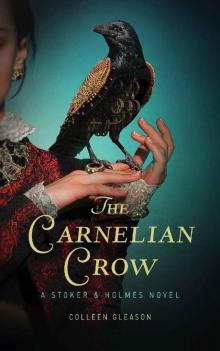 The Carnelian Crow: A Stoker & Holmes Book (Stoker and Holmes 4)
The Carnelian Crow: A Stoker & Holmes Book (Stoker and Holmes 4) The Shop of Shades and Secrets (Modern Gothic Romance 1)
The Shop of Shades and Secrets (Modern Gothic Romance 1) Lavender Vows tmhg-1
Lavender Vows tmhg-1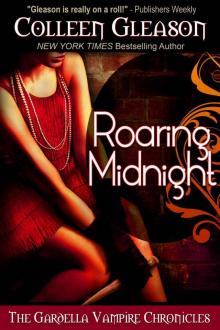 Roaring Midnight (The Gardella Vampire Chronicles | Macey #1)
Roaring Midnight (The Gardella Vampire Chronicles | Macey #1) Lavender Vows (The Medieval Herb Garden Series)
Lavender Vows (The Medieval Herb Garden Series) Dark Secrets: A Paranormal Romance Anthology
Dark Secrets: A Paranormal Romance Anthology Roaring Shadows
Roaring Shadows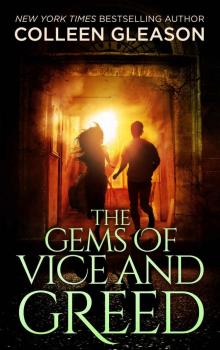 The Gems of Vice and Greed (Contemporary Gothic Romance Book 3)
The Gems of Vice and Greed (Contemporary Gothic Romance Book 3)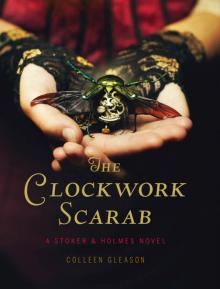 The Clockwork Scarab s&h-1
The Clockwork Scarab s&h-1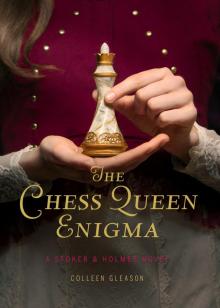 The Chess Queen Enigma
The Chess Queen Enigma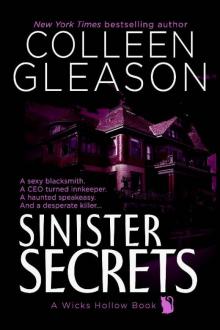 Sinister Secrets
Sinister Secrets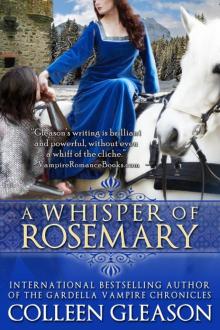 A Whisper of Rosemary (The Medieval Herb Garden Series)
A Whisper of Rosemary (The Medieval Herb Garden Series) Dark and Damaged: Eight Tortured Heroes of Paranormal Romance: Paranormal Romance Boxed Set
Dark and Damaged: Eight Tortured Heroes of Paranormal Romance: Paranormal Romance Boxed Set Roaring Shadows: Macey Book 2 (The Gardella Vampire Hunters 8)
Roaring Shadows: Macey Book 2 (The Gardella Vampire Hunters 8)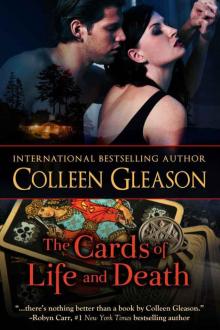 The Cards of Life and Death (Modern Gothic Romance 2)
The Cards of Life and Death (Modern Gothic Romance 2)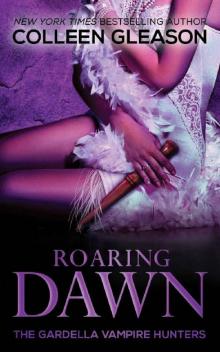 Roaring Dawn: Macey Book 3 (The Gardella Vampire Hunters 10)
Roaring Dawn: Macey Book 3 (The Gardella Vampire Hunters 10)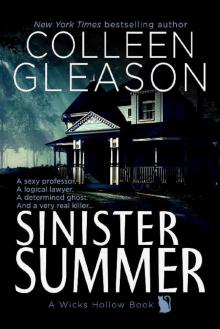 Sinister Summer
Sinister Summer Sinister Sanctuary: A Ghost Story Romance & Mystery (Wicks Hollow Book 4)
Sinister Sanctuary: A Ghost Story Romance & Mystery (Wicks Hollow Book 4)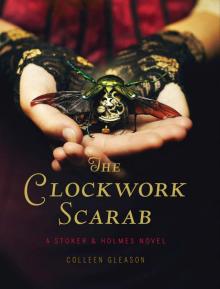 The Clockwork Scarab: A Stoker & Holmes Novel
The Clockwork Scarab: A Stoker & Holmes Novel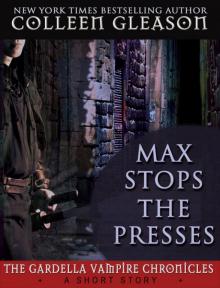 Max Stops the Presses
Max Stops the Presses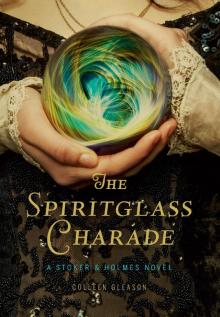 The Spiritglass Charade
The Spiritglass Charade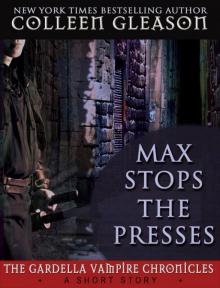 Max Stops the Presses: A Gardella Vampire Chronicles Short Story
Max Stops the Presses: A Gardella Vampire Chronicles Short Story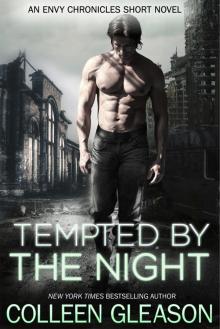 Tempted by the Night
Tempted by the Night